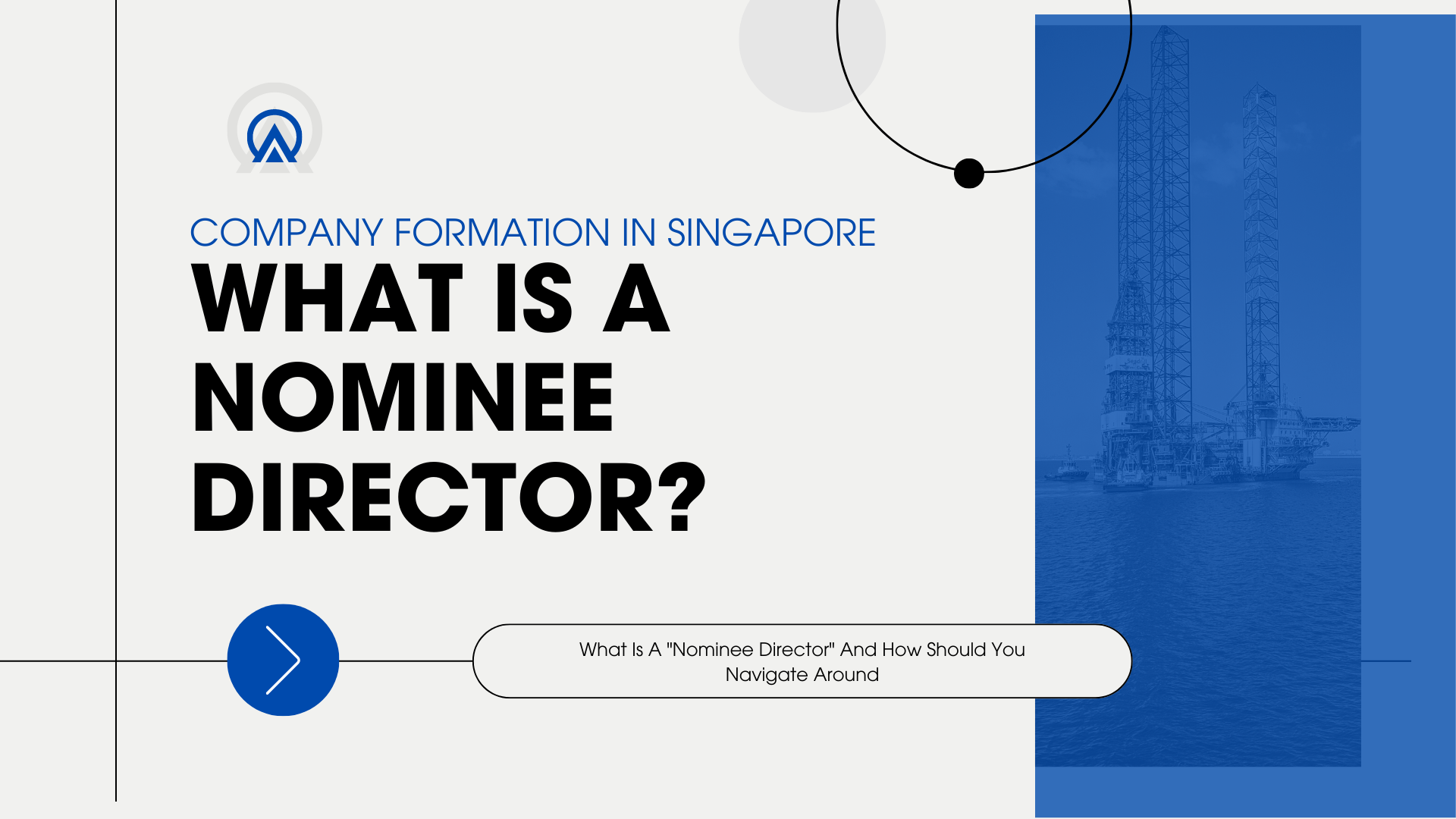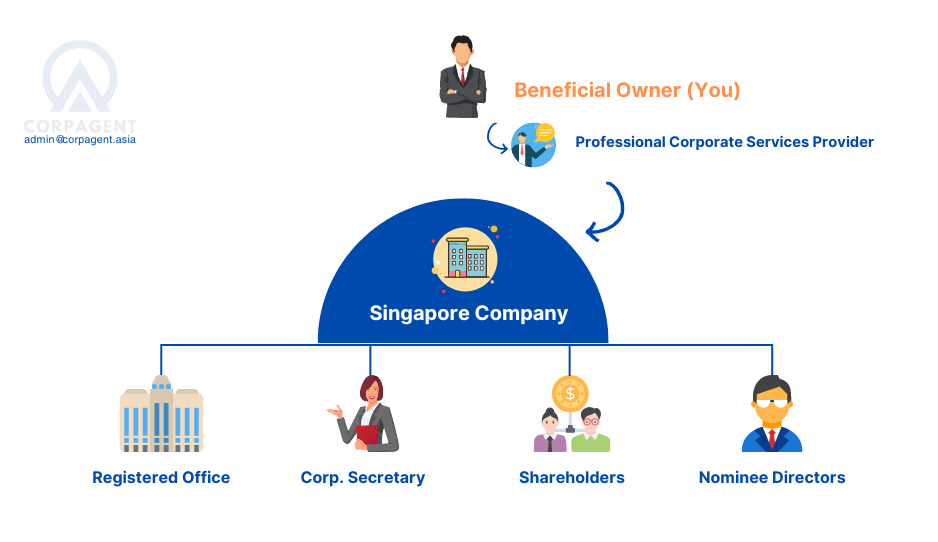What Is A “Nominee Director” In A Singapore Company And How Should You Navigate Around
04-07-2019

Being an open-minded country as it is, Singapore allows foreigners to freely start their businesses under its jurisdiction. However, foreigner-owned businesses in Singapore must have at least one local director for compliance purposes. There are ways to seek a Nominee Director, or be the Nominee Director, but many would hire a Nominee Director for convenience.
In this article, CorpAgent summarizes all you need to know about the so-called “Nominee Director”: what they do, who are eligible to be one and who are not, and how to appoint one for your company.
Why Singapore requires a resident director for foreigner-owned companies
As more foreigner entrepreneurs discover Singapore, this has given the country both opportunities and risks, with the risks being the rising possibility that these foreigner-owned businesses will be harder to control, more prone to breaking the law and abandoning their Singapore operations and fleeing the country without punishments. As we say breaking the laws, the said crimes often include tax evasion, engaging in illegal transactions, committing fraud towards clients and partners, etc. This foreseeable risk demands that the Singapore government impose certain control measure upon foreigner-owned businesses, which tempted the release of the Section 145 of the Companies Act requiring “every company to have at least one director who is ordinarily resident in Singapore.”
Foreigner entrepreneurs have been aware of this law and often they resort to appointing a Nominee Director for their Singapore business. These locals will be responsible for overseeing the companies’ business activities and ensuring that these companies comply with the local laws.
The Nominee Director is liable for the companies under their name and thus, is subject to punishments under the Singaporean law if the companies commit any wrongdoing. The Nominee Director, therefore, is committed to doing anything within their reach to ensure that the companies abide to the local laws. For example, they will review the company’s annual reports before they are submitted to the government.
Requirements for a Nominee Director in Singapore
A “nominee” is a third party that represents an organization when it fails to fulfill a certain role by its own.
The term “Nominee Director” suggests that this director is non-executive and only exists for legal purposes. In other words, the Nominee Director does not directly take control of the businesses’ operations such as making business decisions or signing key contracts. However, this does not mean that the Nominee Director cannot be involved in your companies’ matters. They can still oversee the companies’ business activities, as said, to make sure the companies abide by the Singaporean laws, and perform administrative tasks.
Who are eligible to be the Nominee Director?
According to the Singapore Companies Act, a nominee must be:
- A citizen or permanent resident (PR) holder of Singapore or a holder of an Entrepass work visa with a permanent Singapore address; and
- At least 18 years of age
A nominee must not be:
- An undischarged bankrupt (i.e., not declared by a court to be free of debts and legal constraints)
- Convicted of any offense involving fraud and dishonesty that carries a prison term of more than three months
- Convicted in a court of three or more ACRA filing violations
- Been involved with three or more companies that ACRA barred within the last five years.
- Disqualified for Companies Winding Up on the grounds of National Security or Interest
- Disqualified for Unfit Directors of Insolvent Companies
- Disqualified for Failure to Make Returns
Duties of a Nominee Director in Singapore
A Nominee Director is distinguished from an executive director in that the former does not directly take part in the company’s business matters, unlike the latter. From the legal perspective, however, there is no distinction in powers between a Nominee Director and an executive one.
According to Section 157A of the Companies Act, directors can exercise all powers of a company in order to manage and run its business, except the powers that the Act or the company’s constitution requires the company itself to execute instead.
Typically, your company nominee has legal responsibilities as below:
- Organize annual general meetings, submit yearly returns to the Accounting Compliance Regulatory Authority of Singapore (ACRA), and
- Send tax returns to Singapore’s Inland Revenue Authority (IRAS)
Failure to follow the law is an offense that carries fines, penalties, and legal action.
The risks of using Nominees
If you are using nominee shareholders, you face the risk of losing ownership of the company. If you are using nominee directors, you face the risks of losing confidentiality, or the nominees acting on their own will which contradict yours, and having to pay legal fees to defend your rights against your own “Nominee Directors”. Some other substantial risks include:
- Leak of information: The nominee discloses the arrangement to others, jeopardizing shareholders’ identity and liability protection
- Abuse of power within the company: The nominee violates the terms of the agreement (e.g., using company assets for personal gain or abusing the given power)
- Ineffective control: resulting in business dysfunction
- Both parties face civil and criminal penalties for regulatory violations.
- Failure in committing to the duties: The nominee becomes unreachable and fails to report to the appointing shareholders
How to appoint a Nominee Director?
You can appoint a Nominee Director for your Singaporean company following these steps:
Step 1: Sign a Nominee Director agreement
You should have a properly written document signed by the nominee who agrees to only act on your instructions.
In general, the agreement should cover the following topics:
- The terms of the deal with the ND.
- The powers and responsibilities of the nominee.
- Clarification that the nominee is not responsible for the company’s management.
- Clarification that ND cannot give personal guarantees or make business decisions (e.g., signing contracts or opening bank accounts in the company’s name)
- The preferred method of dispute resolution in the event of a dispute
- Other specific duties
Step 2: Create the Register of Nominee Directors
Once you have appointed a nominee, you must enter your nominee’s information into the Register of Nominee Directors.
A Singapore-incorporated company must form and maintain a register of its nominee which contains information about the nominator. The particulars of the nominator vary, depending on the fact that whether the person is an individual or a legal entity.
The register must follow a certain template and will not be made available to the public. However, upon request from ACRA or other public agencies, your company must be able to provide the register and other related documents as well.
All companies must keep a register of nominee directors but there are some exemptions in which a company does not have to keep a register of a nominee in Singapore.
Can the ultimate beneficial owner be their own director?
The short answer is certainly yes. You can free yourself from the nuisance of hiring a third-party person by being the director yourself. This can be accomplished by getting yourself an Employment Pass. This is a type of pass issued to foreigners when they are hired by a local company. If you choose to be director yourself, you can simply establish a company in Singapore and hire yourself as director of the company. Then you can apply for an Employment Pass for yourself (as an employee of a Singapore local company). The Employment Pass will allow you to relocate to Singapore, and by that time you will be the resident director as required by the law.
The downside of appointing yourself director of the company is that the processing of obtaining an Employment Pass can last a few months. While waiting for your Employment Pass to be approved, you will still need a Nominee Director to legally function in Singapore.
Why Should You Use a Nominee Service in Singapore?

Hiring a nominee director on your own, without any proper written agreement, may cause serious risks to your company and valuable shares. To prevent this, it is better to hire one through a trustworthy service provider.
A service provider can select a capable local director for you and help you draft a proper agreement, particularly the clauses that place limitations on the nominee’s ability to perform certain tasks for your company.
The nominee will only be present to help you fulfill the incorporation requirements; they won’t visit your office or get involved in day-to-day activities. Additionally, the nominee will verify that your business is not engaging in any dubious practices by reviewing all of the reports before the papers are submitted.
At CorpAgent, the nominee service is included in the incorporation packages, allowing you to start a business and hire a nominee at the same time while saving time and money.
We do not take deposits for a nominee in Singapore, meaning you only need to pay a one-time fee for our Singapore company incorporation package.
|
Tl;dr
|
CorpAgent is a long-time provider of corporate services including company formation, payment gateway setup and underwriting. Send us an inquiry to admin@corpagent.asia, or contact us here for services.
Some of CorpAgent’s typical services:
Company Formation and Singapore (Nominee Director included)
CorpAgent’s Exclusive: CorpAgent Exclusive: PayPal Pro For Singapore Company
Frequently Asked Questions
How much is it to hire a Nominee Director for my Singaporean company?
The fee to hire a Nominee Director for a Singapore company is between SGD 1,500 and 3,000 per year, depending on the level of risks associated with the business activities of the company.
Do I need a nominee shareholder for my Singaporean company?
A Singapore nominee shareholder is an individual or a corporation who registers as a shareholder on behalf of another person or acts on the direction, instructions, or wishes of another person.
Nominating a company shareholder is legal in Singapore as long as you provide valid reasons for doing so.
Disclaimer: CorpAgent has been doing everything within our reach to convey the most accurate information, but the information provided in this website is strictly for reference purpose only and should not be used as legal advice. For the most authorized legal advice, contact us at admin@corpagent.asia
Other News
Singapore VS Hong Kong : Where is the best place to do business 2023?
Singapore and Hong Kong have been vying for dominance as Asia’s ‘Best Place to Do Business’ for decades. Both regions have enticed international investors with tax-friendly regulations, simple firm incorporation procedures, and superb infrastructure, among other things. Although Hong Kong has a longer history as a corporate center, Singapore has quickly caught up, eroding Hong Kong’s supremacy in the area. Singapore has been fast to implement business-friendly regulations that have attracted the majority of global companies to build their Asian presence on its shores.
What documents are required for opening a business bank account in Singapore 2023?
When you’re ready to start taking or spending money as your business, open a business account. A business bank account keeps you legally compliant and safe. It also has advantages for your customers and workers.
Today, we’ll look at Singapore’s banking business, which is a sophisticated financial ecosystem of local and foreign institutions. You will learn about the procedures for creating a corporate bank account, the required documentation, and the variety of banking services. And if you’re interested in opening a business bank account in Singpore, we’ll provide you with consultancy to help you, please contact us through https://corpagent.asia/
RISKS & TIPS FOR OPENING A BANK ACCOUNT FOR START-UPS IN HONG KONG
The difficulty of obtaining commercial bank accounts in Hong Kong has been well – recognized in recent years. It is also really complicated. Despite media attention and pressure from the Hong Kong Monetary Authority, InvestHK, Chambers of Commerce, and Hong Kong business organizations, opening bank accounts remains difficult for start-ups and small and medium-sized firms in particular.

Top 3 Crypto Exchanges Singapore 2023
Singapore is a prominent financial center that has experienced an increase in cryptocurrency use. Investors are seeking for the finest crypto exchange in Singapore, with up to 93% of its population having moderate knowledge of the crypto business.
This article will guide you some newest and safest pros and cons, provided base on top reviewers of top 3 crypto exchanges in Singapore:







